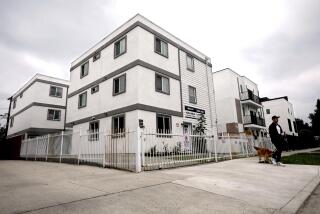Residents Want Prostitutes Out of Wrigley Area
LONG BEACH — As this city’s prostitutes know, a successful business depends on a prominent location.
That’s why most local streetwalkers ply their trade along Pacific Coast Highway on the western edge of the city, police say.
Heavy traffic and the strip’s notoriety guarantee an abundance of customers. And the route is lined with motels where prostitution arrests have been made, according to police officers.
And the hookers, whom police describe as mostly drug addicts who charge $30 to $50 for sex, often avoid having to rent rooms altogether. They turn tricks in customers’ cars in the nearby Wrigley residential district north of the highway.
‘Our Eyes Are on Them’
Residents say they want to fight the tawdry invasion. Backed by two area city councilmen, they are planning to picket along the highway Saturday to try to stamp out prostitution.
“We want to let the motel owners and the hookers and the drug pushers and everyone else know that the Wrigley Assn. has our eyes on them and we want them out of the neighborhood,” said Kathy Cangro, an organizer of the protest. “They are using our streets and our lawns. They are not just doing their business on PCH.”
Police say they thought they had brought the flesh trade under control earlier this year. Lately, however, prostitution is again rampant along the strip from Long Beach Boulevard to the city limit.
“It’s a high-traffic area,” said Police Vice Sgt. Buz Williams. “You have a lot of fleabag motels along there that cater to that clientele.”
Vice units are patroling the region day and night, Williams said. Forty-two customers were arrested July 20 in a sweep that used undercover policewomen posing as streetwalkers. Last year alone, he said, more than 800 prostitution arrests were made in the city, the majority of them along Pacific Coast Highway.
When customers pick up hookers and drive them into the surrounding neighborhood for so-called “car dates,” police have been able to follow along occasionally and make arrests on suspicion of lewd conduct, Williams said. But such arrests are not easy, he said, because prostitutes are on the lookout for cops.
Williams blames the resurgence in prostitution, in part, on a recent lowering of the standard bail for suspected prostitutes.
Besides putting the pressure on prostitutes and their clients, Williams said police are using a law that prohibits motel managers from renting the same room out more than once a day.
Police Plan Lawsuits
He said officers plan to try a “red-light abatement” effort by filing civil lawsuits against motel operators catering to hookers. He said the method has been used successfully by police in Los Angeles.
City Councilman Clarence Smith, whose district includes the PCH strip, said that city planners are searching for ways to make sure that motel operators run a clean business.
“As long as the motel (operators) allow the prostitutes to use those rooms, we’ll have a problem,” Smith said.
Councilman Ray Grabinski, who represents much of the Wrigley residential district, said he does not believe that the typical fine of a few hundred dollars is sufficient punishment for those convicted of soliciting a prostitute. He favors encouraging newspapers to publish their names.
“If we don’t put pressure on the customers, the cycle of crime will continue,” he said.
Smith and Grabinski said they plan to participate in Saturday’s protest march. The protest will start at 4 p.m. at Daisy Avenue and Pacific Coast Highway, Cangro said.
More to Read
Sign up for Essential California
The most important California stories and recommendations in your inbox every morning.
You may occasionally receive promotional content from the Los Angeles Times.









